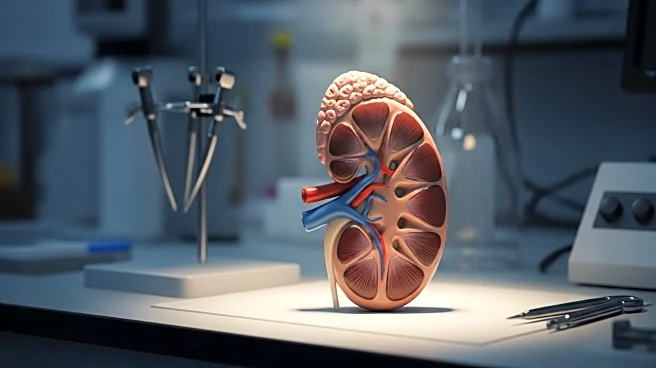What's Happening?
Researchers from the University of Leiden have developed a novel approach to study chronic kidney disease (CKD) by using kidney organoids derived from patient skin biopsies. These organoids were created using induced pluripotent stem cells (iPSCs) from patients with homozygous G1 and G2 mutations in the apolipoprotein L1 (APOL1) gene, which are known risk factors for CKD. The study, published in Stem Cell Reports, reveals that these mutations lead to significant metabolic reprogramming in podocytes, a type of kidney cell. The research team employed CRISPR technology to correct these mutations and used a combination of single-cell transcriptomic and spatial metabolomic data to analyze the effects. They discovered that the mutations cause mitochondrial dysfunction, characterized by reduced oxidative phosphorylation and increased glycolysis, especially under inflammatory stress.
Why It's Important?
This research is significant as it provides a deeper understanding of how APOL1 mutations contribute to CKD, particularly in individuals of West African descent, where these mutations are more prevalent. The findings highlight mitochondrial impairment as a central factor in the disease's progression, offering a potential target for therapeutic interventions. By establishing a reproducible organoid model, the study paves the way for testing new treatments aimed at restoring mitochondrial function or mitigating inflammatory responses. This could lead to more effective management strategies for CKD, benefiting millions of patients worldwide, especially those with genetic predispositions.
What's Next?
The study's findings suggest that future research could focus on developing drugs that target mitochondrial dysfunction in APOL1 mutation carriers. Additionally, the organoid model provides a platform for further exploration of therapeutic interventions that could prevent or reverse the metabolic changes observed in CKD. Researchers may also investigate the role of inflammatory stress in accelerating the disease, potentially leading to new strategies for managing CKD in patients with APOL1 mutations.
Beyond the Headlines
The use of patient-derived organoids represents a significant advancement in personalized medicine, allowing for the study of genetic diseases in a context that closely mimics human physiology. This approach could be extended to other genetic conditions, providing insights into disease mechanisms and facilitating the development of targeted therapies. The study also underscores the importance of understanding genetic diversity in medical research, as it highlights the unique challenges faced by populations with specific genetic backgrounds.









